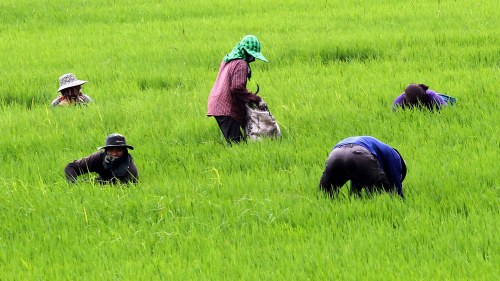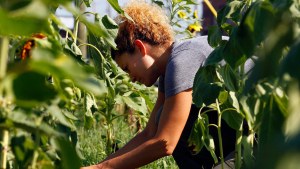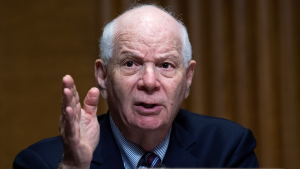Radioactive Water, Cartel in Control, and Immigration Shortage
Check out our roundup of the week's top news and research in food, agriculture, and global development.

Top Story
A Dystopian Future: Crop Failure Uncertainties
A new study highlights an increasing concentration of greenhouse gas in the atmosphere and points to the likelihood of future major harvest failures. These failures can lead to price spikes, food insecurity, and civil unrest, and would consequently increase the number of people facing hunger by 80 million in less than 30 years. Experts warn that without immediate action, this dystopian future will become reality.
Council Insights
Inspiring Action
"Food insecurity is very much dependent on the power structures. It’s usually the marginalized communities who are the ones suffering from food insecurity,” said Hannah Bernstein in episode 10 of Youth in Agriculture: Transforming Local Food Systems. Listen in or read the transcript on our website.
 Food and Agriculture
Food and Agriculture
Food and Agriculture
Radioactive Water
UN regulators approved Japan’s plan to release formerly radioactive water from the Fukushima nuclear station, leaving Japanese fishing unions skeptical of its safety. South Korea and China maintain their long-held bans on the area’s seafood and will continue to inspect food products for radioactivity and mark their origin.
Cartel in Control
Apatzingan, Mexico—a regional center for agricultural trade—is experiencing inflated food prices. The Viagras cartel has increased prices by requiring “protection payments” from farmers and ranchers, raising the cost of goods from their standard rate elsewhere in Mexico.
Single Crop Summer
The Thai government has requested farmers limit their rice to a single crop following below average rainfall and El Niño conditions. Causing declining rice and sugar outputs, the rapidly changing weather conditions foreshadow inflation and rising food and animal feed prices in Southeast Asia.
Deeper Dive
Why Is a Drug Cartel in Control?
Apatzingan, Mexico has long been dominated by the Viagras cartel. Tolerated by the Mexican government, the cartel is able to extort locals with minimal consequences. Although the 2013 to 2014 armed farmers’ movement kicked out one cartel and offers locals some hope for change, the extracted cartel was simply replaced with another one; reviving an armed civilian resistance to drug cartels is unlikely to be successful.
Resilience
Shrub Victory
Sheep and cattle farmers in Australia are planting an elite variety of saltbush to supplement feed during dry conditions caused by the El Niño weather cycle. The variety is known for its higher nutritional value, improved palatability for livestock, and its ability to regenerate saline or infertile land.
DC Report
Immigration Shortage
DeSantis’ sweeping new immigration law in Florida criminalizes undocumented immigrants and their employers, causing a shortage of seasonal agricultural laborers who are hesitant to return or are fleeing the state. Farmers are expressing concerns over the labor shortages, saying that they cannot run their farms without immigrants.
Big Actors
Green Ammonia
The world's leading producer of nitrogen fertilizers has committed to reducing greenhouse gas emissions and securing global food supplies. The company aims to achieve a 30 percent reduction in scope one and two emissions by 2030, and achieve carbon neutrality across all scopes by 2050. One of the key strategies is producing clean ammonia, which is made using renewable and carbon-free hydrogen in an electrolyzer.
Big Ideas
Soil Sequestration
Marginal improvements to agricultural soil worldwide can contribute to keeping global warming within the 1.5 degrees Celsius target. Farming techniques that enhance long-term fertility and yields can store more carbon in soil—storing just one percent more carbon in approximately half of the world's agricultural soil could absorb approximately 31 gigatons of carbon dioxide annually, keeping global temperature changes within 1.5 degrees Celsius.
Ask an Expert
The Mexico-US dispute over genetically modified corn is raising concerns about the safety of genetically modified organisms (GMOs). Are GMOs safe? What are their potential benefits?
"Scientists have emphasized that the benefits of GMOs outweigh any risks, despite challenges with consumer acceptance. Genetic modification has the potential to produce crop varieties that generate more food, have better nutritional content, and require less land, water, and pesticides to grow. This could be a much-needed solution to the challenges that population pressures and climate change pose for food security.”
— Research Assistant Kailey Griffith in Mexico's GM Corn Ban Is about More Than Biotech


Have a question about food and agriculture? Ask one of our experts at the Center on Global Food and Agriculture to get an answer in next week's Global Food for Thought!
Council Events
Did you miss one of our previous livestreams? Don't worry! They are all available on our website to watch at any time.
Other Upcoming Events
Research Findings on Resilience and Social Cohesion in Burkina Faso and Niger
Date: July 11
Time: 9:00-10:30 a.m. ET
Youth-Led Farm Tour: Grant Park
Date: July 12
Time: 5:00 – 5:30pm CT
Becoming Friends with Plants
Date: July 21
Time: 10:00 – 4:00 p.m. ET
2023 UN Food Systems Stocktaking Moment
Date: July 24 – 26
Regenerative Agriculture and Food Systems Summit 2024
Date: March 19 – 20
Land Acknowledgement Statement
The Center on Global Food and Agriculture recognizes it occupies the ancestral land of the Kiikaapoi, Peoria, Kaskaskia, Bodwéwadmi, and Myaamia people. Indigenous communities around the world disproportionately experience the pressures of climate change, global conflicts, and the COVID-19 pandemic, while simultaneously stewarding 80 percent of the world’s biodiversity. These Indigenous tribes and nations are the original owners of this land and continue to be systemically erased by policies and practices that ignore their histories. To learn more about Indigenous foodways and practices, check out our 2022 blog series "Stewardship, Sovereignty, and Solutions."
Related Content
- Embracing Dandelions as Food and Medicine
- Going Beyond Regenerative Agriculture on Tribal Lands
- Expanding "638" to Enhance Native American Food Sovereignty
- Flavors and Culture: Food Systems Through Indigenous Women's Eyes
- A Thanksgiving Legacy: Fighting for Indigenous Food Sovereignty
- Native Food Sovereignty: Strengthening Connection to Culture
- Reconnecting to Indigenous Food Sovereignty Values and Practices
- Embracing Interconnectedness: How Indigenous Foodways Can Save Us






